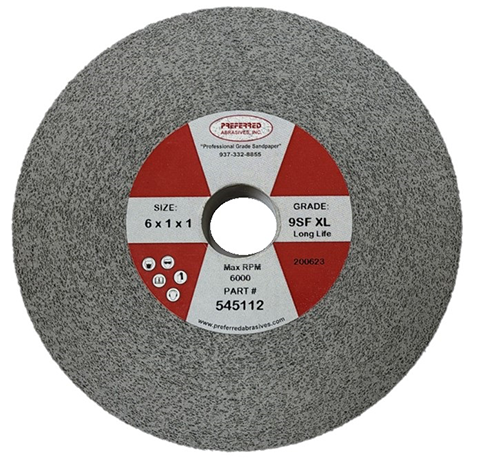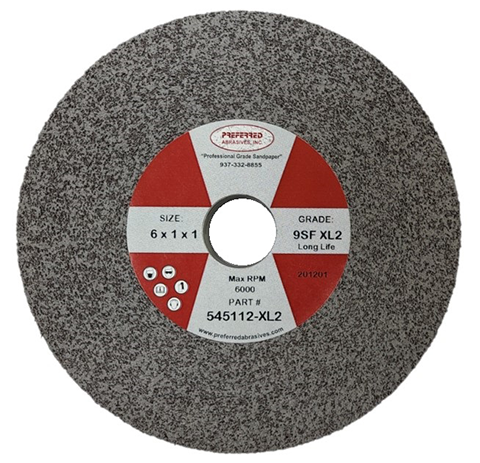How to Choose the Correct Convolute Wheel
Convolute Wheels
Convolute wheels are used in various types of deburring, part finishing and blending, and even corrosion, rust, and oxidation removal. Preferred Abrasives’s convolute wheels are designed with compressed, nonwoven abrasives wrapped convolutely around a center core, producing a one-directional wheel.
Each type of convolute wheel is specially designed for certain applications and uses. Preferred Abrasives offers a variety of convolute wheels to meet each need. Below, we will discuss the various types of convolute wheels available and the variables you need to consider when selecting one for your job.
3 Variables to Consider When Selecting a Convolute Wheel
Preferred Abrasive’s convolute wheels are all manufactured with non woven, high quality materials to ensure durability and an increased lifespan. Before you select a convolute wheel, you need to understand how they are identified and what your part’s final application is.
While Preferred Abrasives carries a range of convolute wheels, our most popular types include 7SF, 8SF, 9SF, 9AF, or 9AM. The first digit corresponds to the density (hardness), the second digit corresponds to the grain (A stands for aluminum oxide and S stands for silicon carbide), and the final digit is the grade designation (F stands for Fine and M stands for Medium).
Here’s What You Need to Know to Choose the Correct Convolute Wheel for Your Project:
1. Convolute Wheel Hardness
Convolute wheel hardness is determined by the tightness of each wrap of material and the amount of bond (resin) used in the wheel.
Convolute wheels most often come in three hardness levels: soft, medium, and hard. These levels correspond to identifying numbers to easily identify the proper wheel type. Soft convolute wheels are 7, medium convolute wheels are 8, and hard convolute wheels are 9.
Typically, a level 8 hardness convolute wheel is a good starting point and you can either move up or down in hardness if needed. A good test to know if your convolute wheel is too soft for burr removal is if the wheel is dispersing high levels of dust. On the other hand, a level 9 convolute wheel could be too hard and cause flat spots where the burr was.
Preferred Abrasives carries both XL and XL2 convolute wheels. The XL wheels are specially created with an open web construction that adds to their finishing capability. The XL2 wheels contain additional grain and resin that add to their durability and hardness. XL2 wheels are ideal for heavy deburring and rapid stock removal. Again, it is essential to understand the material’s final application before you start grinding to ensure you choose the correct hardness level.
2. Convolute Wheel Abrasive Grain
Preferred Abrasives offers convolute wheels in two abrasive grain materials, silicon carbide and aluminum oxide. Silicon carbide provides a brighter and shinier finish, while aluminum oxide provides a duller satin finish.
3. Convolute Wheel Grit
Most convolute wheels come in two grits: fine or medium grit. Depending on your desired outcome, fine grit wheels are by far the most common and are better for small burs and will provide a better finish, while the medium grit is coarser and used to remove material faster when surface finish is not critical.
What is the Optimal Speed for a Grinder?
The speed at which you grind has a significant impact on the convolute wheel you use, but also on the material you are working with. The type of convolute wheel you choose and your end goal of the material dictate the ideal speeds your grinder should be operating at.
At Preferred Abrasives, we recommend the following grinder operating speeds for the following applications:
- Decorative Finishing: 500 – 3000 SFPM
- Composites/Soft Materials: 1200 – 2700 SFPM
- Deburring: 5000 – 6500 SFPM
- Blending/Polishing: 6000 – 8000 SFPM
Tip:
During the grinding process, extreme heat may be generated and cause possible scorching of the material. To reduce heat and extend the wheel’s life, lubricant coolants including water and some water-soluble oils, can be used. These coolants also help to reduce surface roughness to create a smoother material surface.
Preferred Abrasives offers a variety of convolute wheels to meet every need and requirement. Each convolute wheel is specially designed for certain applications, so which one you choose matters. The wheel hardness, abrasive grain, and grit are important identifiers you need to know in order to properly grind your material.


